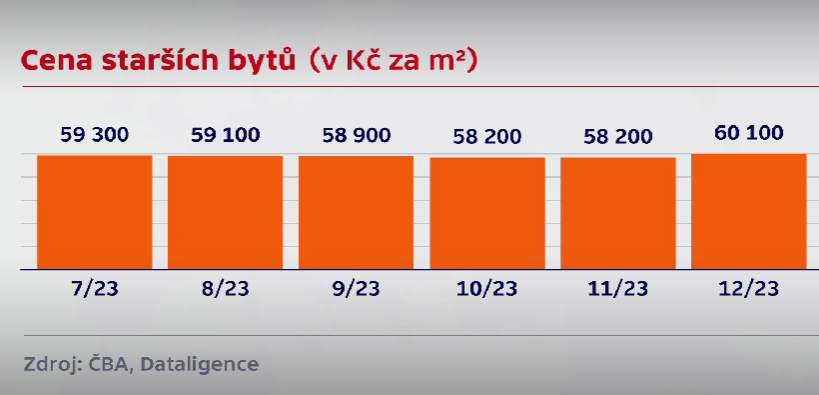The Czech Republic’s residential market is finally showing signs of life. “Especially in the second half of 2023, the market was far more active than in the previous four quarters,” says the director of Dataligence Milan Roček. “We’re gradually moving towards normal relationship between supply and demand that was here before the war and the before the exaggerated boom in 2021.”
One reason is that apartment prices have stagnated, while wages have grown, at least in nominal terms. “The gap between the growth of prices for real estate and the growth of household income has closed a bit compared to the end of 2022, but there’s still a big difference,” economist Jakub Seidler told Czech Television. “That means the affordability of housing meaning the sale price for real estate and household income is still significant.”

Price per sqm for secondary market flats
Going forward, falling interest rates on mortgages will take center stage, now that the Czech National Bank reduced its key interest rate by 50 bps. The biggest Czech banks have started to reflect the change with careful rate cuts linked to specific fixed terms. ČSOB’s cheapest offering at the moment is a 1-year fix which can be had at 5.59%, down from 5.89%. It’s 5-year fix, however, came down only by 10 bps to 6.09%. Česká spořitelna is also cutting its rates and now offers a 3-year fix for 5.59%. Together, Česká spořitelna and ČSOB make up more than half the entire market. The third biggest mortgage provider, Komerční banka, has also announced rate cuts.
Smaller banks are using the sudden rebirth of interest in mortgages to win new clients. Air Bank for example has cut its offering by 50 bps 4.79% for refinanced mortgages. That’s the second bank after Moneta Money Bank to dip below the 5% line. In general, the large banks are emphasizing shorter term loans out of fear of sparking a wave of refinancing. Czech banking regulations favor the consumer, in the sense that they can usually refinance their loans without incurring huge penalties.
Banks warn this is both unfair and counter-productive. They point out that they have to borrow money on the inter-bank market at terms set at the time of the original loan. The long-term result of the risk they face from potential refinancing requests results in higher rates for everyone.
Also in ThePrime
Wiedermann: UBM pushing for acceptance of timber construction






